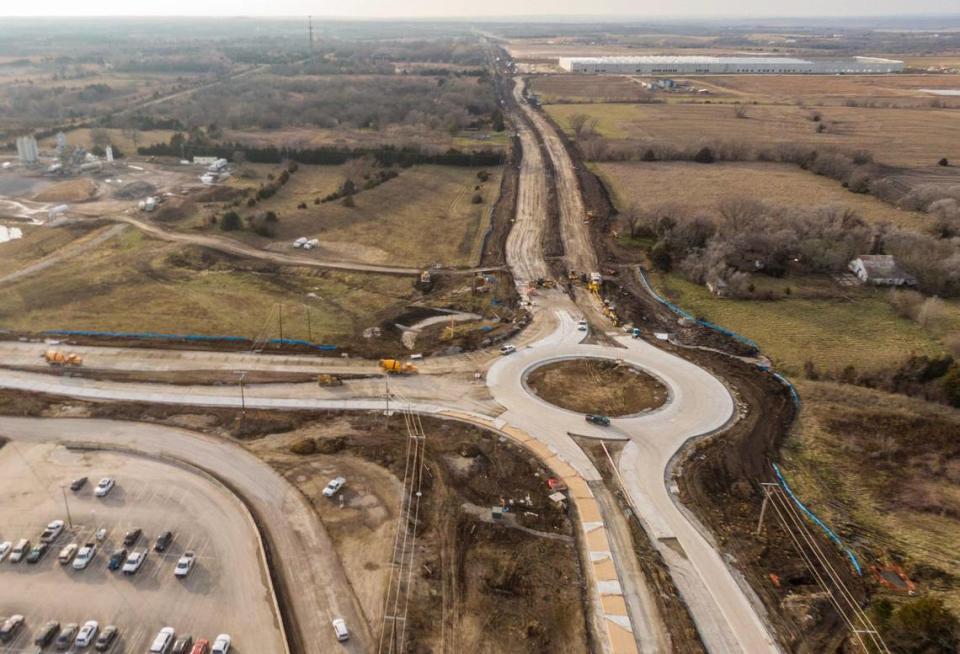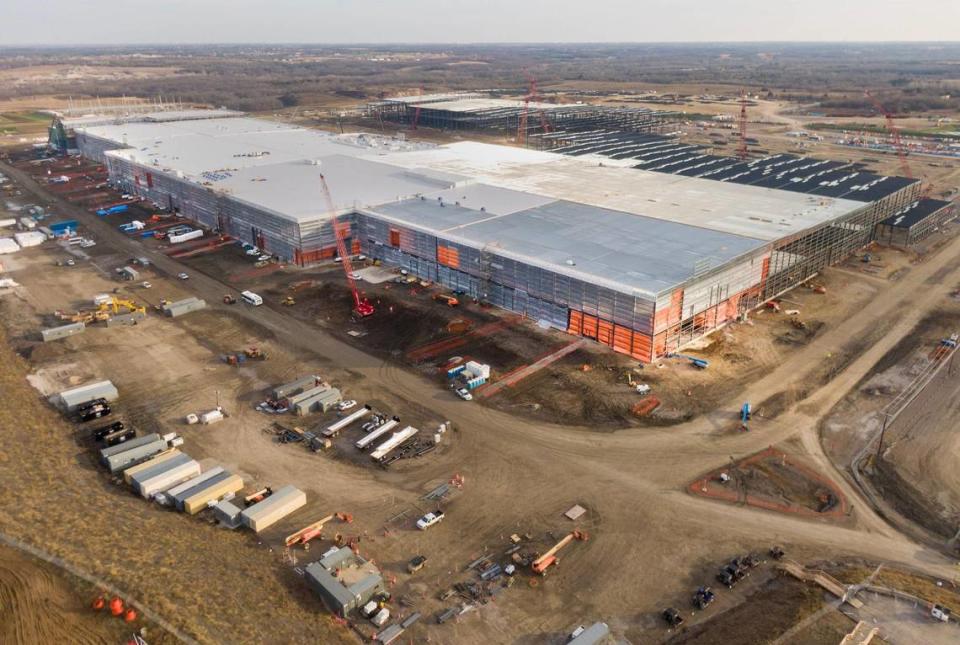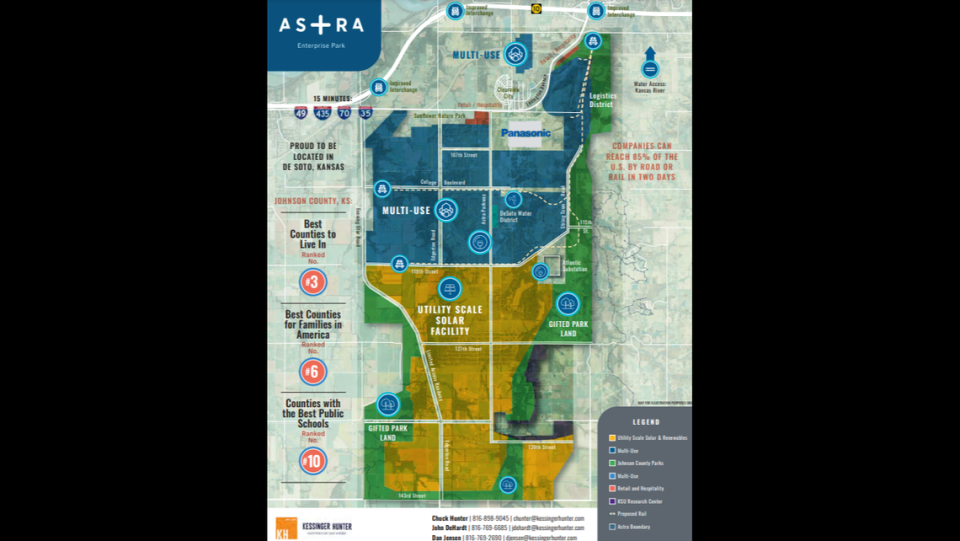Western Johnson County braces for ‘intense development.’ Can the rural roads take it?
Reality Check is a Star series holding those in power to account and shining a light on their decisions. Have a suggestion for a future story? Email realitycheck@kcstar.com.
With multi-billion-dollar industrial development cropping up and standing to transform Johnson County’s more rural, western end, a big question still hangs in the air:
How will people get there?
County and city officials are preparing for the expansive redevelopment of the former Sunflower Army Ammunition Plant in De Soto, kicked off by construction of the $4 billion Panasonic battery plant that’s expected to open in 2025. They say it will require major infrastructure work to reconfigure disconnected and nearby roads, some of which are still gravel, as well as in surrounding communities most likely to feel the development boom.
“There will be tremendous change. And that will be difficult,” Public Works Director Brian Pietig told the Johnson County Commission last week. “There will be lots of development. And when I look at Panasonic, the first development in that (industrial park), and 4,000 employees, I think it’s going to come sooner rather than later.”
Pietig compared the growth expected at the new Astra Enterprise Park in De Soto to that seen in southwestern Johnson County, when the sprawling Logistics Park Kansas City intermodal facility brought corporate giants and thousands of jobs to Edgerton, a town of 1,700. Officials there have touted the jobs created and added tax revenue. But many neighboring residents have mourned the loss of quiet farmland, and some even tried to create their own town to keep out the noise and traffic.
Preparing for the major development in the northwest, officials say, will take buy-in from several municipalities, likely adding to the millions in public dollars already committed for roadwork at the Panasonic development. Last week, Johnson County commissioners moved forward with a $250,000 transportation study to examine the significant infrastructure improvements that officials say will be needed to facilitate the industrial growth.
The county is partnering with Douglas County, the Kansas Department of Transportation, Olathe, Gardner, Edgerton and De Soto to explore connecting arterial roads that end at the boundary of the industrial park. And it will also look farther out, at the road capacity east to Olathe and south to the county line.
“We see intense development coming into a very rural area,” Pietig said. And that will mean a growing number of employees driving to work, truckers making deliveries and families moving in.

‘Transformational impact’
De Soto, with 6,200 residents, ballooned in size when it annexed 9,000 acres of the former ammunition plant just south of Kansas 10 Highway that the U.S. Army had been cleaning up for years.
That was in preparation for the arrival of Japanese electronics company Panasonic, which is building a 4-million-square-foot electric vehicle battery plant on the site, and plans to hire 4,000 workers. Panasonic’s decision to build in Kansas brought much fanfare, with officials statewide celebrating the economic investment. It also played a role in Gov. Laura Kelly’s successful reelection campaign.
The company has received an unprecedented tax incentive package for the project.
Kansas officials awarded Panasonic $829 million in incentives from a new program designed for the firm. The state later handed over the Kansas Bioscience Authority building in Olathe, valued at nearly $5 million, to Panasonic for free. The city of De Soto added another $200 million in local property tax breaks. Johnson County committed $15 million, half for a new fire station near the plant and half for road improvements.
And the state transportation department has carved out $26 million for infrastructure work, which includes updating about 4.5 miles of the current two-lane asphalt road to be a divided four-lane roadway.
But the 300-acre Panasonic development is only the beginning. A representative of Kansas City real estate firm Kessinger Hunter, which is developing the new Astra Enterprise Park, said other companies have shown “great interest” in building there. About 600 acres of land are under final negotiations.
The development team says the site is equipped for logistics and distribution, as well as high-tech facilities, such as data centers, and they are “committed to uses that foster sustainability, use and generation of renewable energy.”
“We also have several areas designated as multi-use, which covers a range of options, including commercial, residential or mixed-use,” the representative said.
Kansas City-based Savion, LLC, is developing a large solar power facility on more than 2,800 of the acres.
And the developer says it will donate nearly 3,000 acres for public benefit, including 2,000 acres to be preserved as park land, with other space going to the new fire station and for De Soto to build a water tower.
“We believe Astra has the opportunity to make a transformational impact in western Johnson County,” the representative with Kessinger Hunter said. “Historically, the property was home to thousands of jobs that supported thousands of families. Our belief is that will be true again over the next decade.”

‘Connectivity is critical’
As development of the new industrial park gains momentum, Johnson County officials said traffic plans are an urgent priority.
“This is so important to the unincorporated area, along with people that live in that city. Where are they going? How’s the transportation going?” Commissioner Shirley Allenbrand said during last week’s meeting. “I think it needs to happen now. I feel we’re almost too late.”
Access to and from the industrial park remains a challenge because the way the road system was set up, with roads cut short at the plant boundary. And Mike Moriarty, KDOT’s interim director in the planning and development division, said there are also “significant topographical and floodplain issues which have contributed to the disjointed pattern of arterial roads.”
“Connectivity is critical,” Moriarty said in an email.
De Soto City Administrator Mike Brungardt said in an email that the former ammunition plant “presented a barrier to roadway connections in the area for the last 80 years,” which he said needs to be addressed to accommodate the industrial park and improve transportation in the city.
Officials also said the study will look at how neighboring communities can handle an increase in traffic.
Even if areas outside of the industrial park do not see significant development, Johnson County spokesman Andy Hyland said in an email the county has “gained population at a rate of 8 to 10 thousand per year so it is a good idea to plan for a potential future that involves annexations and urban development.”
The study also will explore whether improvements are needed from the state transportation department. Meanwhile KDOT is considering expanding K-10 to address traffic and safety issues on the 16.5-mile stretch from the Douglas and Johnson County line to Interstate 435.
Douglas County Public Works Director Chad Voigt said officials expect the eastern part of his county to see increased traffic as well, and “most of the roads crossing our shared county line are narrow gravel roads maintained by local townships.”
“The existing transportation network intentionally avoided the Sunflower Army Ammunition Plant, whereas the Astra Enterprise Park is expected to generate increased traffic in all directions,” Voigt said. “Based on the recommendations, the county may revise future roadway classifications and start planning for construction of paved east/west arterial roads. Those plans will have to include several bridges crossing large streams.”

‘One hot button issue’
While officials across the state praise the potential economic growth and job creation, some neighbors worry about losing the quieter parts of life. Some residents in nearby unincorporated communities and more rural neighborhoods are pushing county leaders to keep them in the loop.
“This is going to be one hot button issue, because for years, the residents in the west and the south have been fighting the idea of a major thoroughfare coming through the unincorporated area,” Commissioner Charlotte O’Hara said at a recent meeting. “So how’s the community been brought in on these discussions? Because they’re going to unload on this. They’re going to be terrified that something is going to be jammed down their throats that they have no desire for in their community.”
Hyland said that “public input will be an important part of the process,” adding that residents will have a chance to voice their opinions as the study’s recommendations are considered by the county commission and other municipalities.
He said it would take about 10 months for the study and a final report to be completed. It would then be up to the counties, state transportation department and cities to consider the recommendations and decide whether to implement them.

